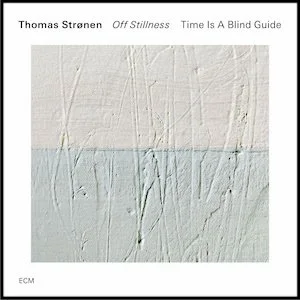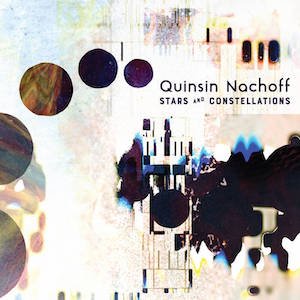Label: ECM Records, 2025
Personnel - Thomas Strønen: drums; Ayumi Tanaka: piano; Hakon Aase: violin; Leo Svensson Sander: violoncello; Ole Morten Vagan: bass.
Time is a Blind Guide is an instrumentally sophisticated aggregation fronted by Norwegian drummer and composer Thomas Strønen, whose blend of organic timbres and luminous sonorities easily conquer the ear and appease the soul. The group’s third recording, Off Stillness, confirms Strønen’s mastery of structure and arrangement, highlighting the instrumentation’s sonic contrasts through natural pulses while maintaining a sense of poised, flowing elegance throughout.
Consisting of seven original compositions, the album opens with “Memories of Paul”, a dedication to two influential musicians who shaped Strønen’s artistic development: drummer Paul Motian and pianist Paul Bley. Existing in an almost abstract state of grace, the piece relies on floating piano gestures, delicate bass movement, sensitive brushwork, and understated string lines. “Season” gently calms both spirit and mind, carried by a cultivated percussive current that draws from folk and world-music inflections. Japanese pianist Ayumi Tanaka plucks and combs the piano strings, producing a reassuring, subtly exotic aura, while violinist Håkon Aase steps forward with lyrical authority. It is a quietly beautiful moment.
“Fall” continues in a similarly hushed, airy vein, inviting a recalibration of the inner compass through dreamy pianism, breezily intersecting strings, and drumming reduced to its bare essentials. Everything seems to float and sway like a feather in the wind. This same depth of commitment and attentive interaction also informs the album’s more animated passages, notably “Cubism” and “Dismissed”. In the former, Strønen’s conversational rhythmic language becomes especially vivid, while Tanaka’s inflected harmonic colors generate a tensile undercurrent that gradually leads toward a staccato-driven conclusion. “Dismissed”, playfully avant-garde in character, is tightly coordinated through incisive punctuations and rhythmic jabs, all working together in a kind of subliminal counterpoint.
The album closes with “In Awe of Stillness”, which begins in a sea of calm before transforming halfway through into an energetic, world-fusion cycle sparked by Tanaka’s subtle complexities and lightness of touch, and an unperturbed bass-and-drums foundation. At this stage, Aase casts his violin lines as the melodic focal point.
In a rare combination of delicacy and boldness, Off Stillness stands as a testament to Strønen’s extraordinary talents. Together, he and his collaborators forge a sound partnership that feels both revelatory and deeply inspiring.
Favorite Tracks:
02 - Season ► 05 - Cubism ► 06 - Dismissed ► 07 - In Awe of Stillness
















